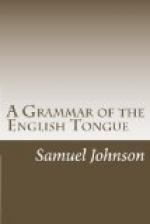of maiming, taking away, changing, transposing,
and softening them.
But while we derive these from the Latin, I do not mean to say, that many of them did not immediately come to us from the Saxon, Danish, Dutch, and Teutonick languages, and other dialects; and some taken more lately from the French or Italians, or Spaniards.
The same word, according to its different significations, often has a different origin; as, to bear a burden, from fero; but to bear, whence birth, born, bairn, comes from pario; and a bear, at least if it be of Latin original, from fera. Thus perch, a fish, from perca; but perch, a measure, from pertica, and likewise to perch. To spell is from syllaba; but spell, an inchantment, by which it is believed that the boundaries are so fixed in lands that none can pass them against the master’s will, from expello; and spell, a messenger, from epistola; whence gospel, good-spell, or god-spell. Thus freese, or freeze, from frigesco; but freeze, an architectonick word, from zophorus; but freeze, for cloth, from Frisia, or perhaps from frigesco, as being more fit than any other for keeping out the cold.
There are many words among us, even monosyllables, compounded of two or more words, at least serving instead of compounds, and comprising the signification of more words that one; as, from scrip and roll comes scroll; from proud and dance, prance; from st of the verb stay or stand and out, is made stout; from stout and hardy, sturdy; from sp of spit or spew, and out, comes spout; from the same sp with the termination in, is spin; and adding out, spin out: and from the same sp, with it, is spit, which only differs from spout in that it is smaller, and with less noise and force; but sputter is, because of the obscure u, something between spit and spout: and by reason of adding r, it intimates a frequent iteration and noise, but obscurely confused; whereas spatter, on account of the sharper and clearer vowel a, intimates a more distinct poise, in which it chiefly differs from sputter. From the same sp and the termination ark, comes spark, signifying a single emission of fire with a noise; namely sp, the emission, ar, the more acute noise, and k, the mute consonant, intimates its being suddenly terminated; but adding l, is made the frequentative sparkle. The same sp, by adding r, that is spr, implies a more lively impetus of diffusing or expanding itself; to which adding the termination ing, it becomes spring: its vigour spr imports; its sharpness the termination ing; and lastly in acute and tremulous, ending in the mute consonant g, denotes the sudden ending of any motion, that it is meant in its primary signification, of a single, not a complicated exilition. Hence we call spring whatever has an elastick force; as also a fountain of water, and thence the origin of any thing: and to spring, to germinate, and spring, one of the four seasons. From the same spr and out, is formed sprout, and




